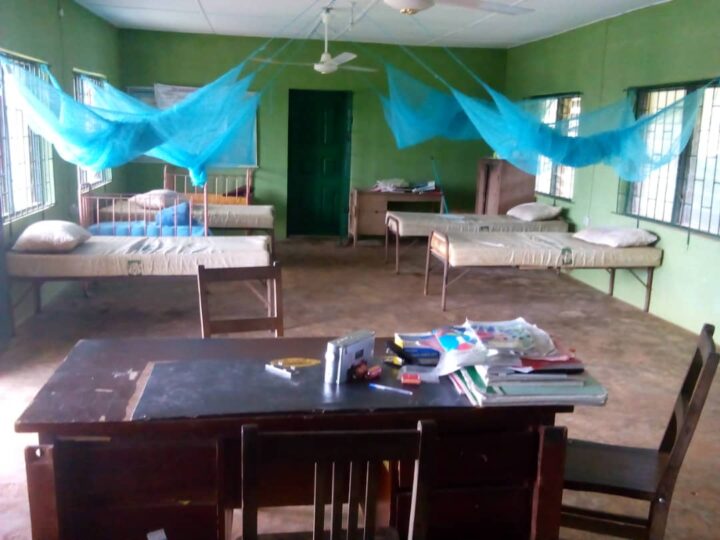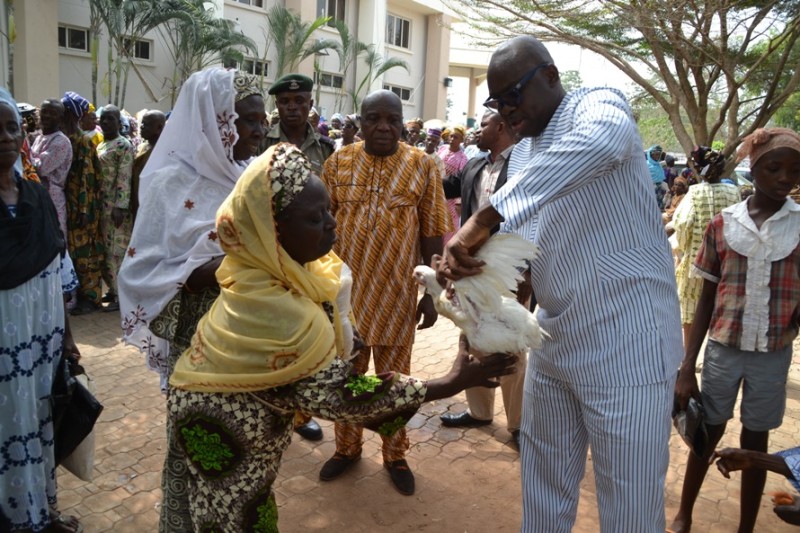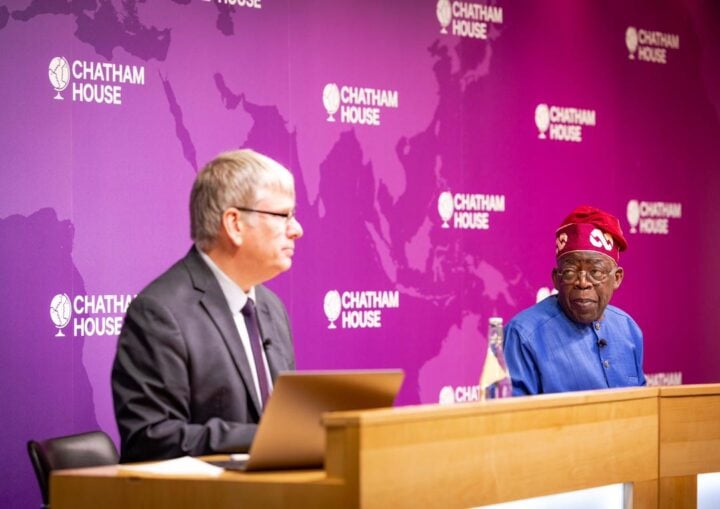It is not news that Nigeria’s Health Care System is not meeting the needs of its citizens. A 2018 Lancet study of global health access and quality ranked our health system 142 out of 195 countries assessed, a fact that factors such as health worker shortage contributes to. The doctor-to-patient ratio is about 1:6500, and between 2007 and 2011, there was a net loss of 2,095 doctors from Nigeria due to emigration. All the medical personnel seem to be japaing.
Nigeria Healthcare System 101:
The Nigerian health system is decentralised into a three-tiered structure with federal, state, and local government responsibilities. Local governments manage Primary Healthcare – for example, local dispensaries. Secondary Healthcare is managed at the state level by the State Ministries of Health (SMOH) – for example, General Hospitals. The role of the Federal Ministry of Health is to frame policies and manage Teaching Hospitals and Federal Medical Centers, which constitute Tertiary Health Care.
The Acts of the Generals:
Advertisement
In 1999, an alternative source of healthcare funding was passed into law by a legislative act under the government of President Obasanjo. The National Health Insurance Scheme (NHIS) was established as a public-private partnership to provide accessible, affordable, and qualitative healthcare to Nigerians. Members of the scheme made contributions to a pool. When a contributing member needed healthcare, Health Maintenance Organisations (HMOs) paid for a substantial portion of the cost of care from pooled funds – a risk-sharing arrangement with an eye to enhancing resource mobilisation and equity. The NHIS also regulated other private health insurance operated by registered HMOs. On paper, the NHIS’ goals and objectives were brilliant. Still, the scheme had a penetration of less than 4% across the nation, impacted by factors such as the earlier referenced medical personnel shortage. The poor penetration of the NHIS led to an overall healthcare delivery system that was inefficient, ineffective, and inequitable. The not-fit-for-purpose NHIS has now died, the Act repealed by President Buhari in May 2022, another Act signed into law, a more confident sounding reincarnation of the NHIS, the word ‘Authority’ replacing ‘Scheme’ to convey a determination to make healthcare more accessible and affordable for Nigerians, after all, the word ‘scheme’ might convey negative connotations in the Nigerian context. All well-wishers of Nigeria are praying that the National Health Insurance Authority (NHIA) will be a vehicle that will drive Nigerians to good or better health. In true Nigerianees speak, it is laudable that the NHIA seeks to act not just as an insurer, but as a regulator, an investor, and an implementer.
Public Health vs Population Health – A Health System Failing Population Health:
A tenet of healthcare is ‘standard of care’ – the early diagnosis and treatment of disease. If a citizen cannot afford care or get timely access to care, then the existence of a national healthcare system is meaningless to them – thus, that health system is not fit for purpose. Nigeria’s major public health challenges are infectious diseases, maternal and infant mortality, poor sanitation and hygiene, disease surveillance, non-communicable diseases, and road traffic accidents. The programmes our health system designs to address health care still operate within the realm of public health. A key driver that causes this is that population-level health and mortality data crucial for evidence-informed policy are non-existent in Nigeria. There has been a marginal increase in health expenditure since 2001, yet health outcomes remain poor compared to countries with at-par or lower health expenditure.
Advertisement
A third of cancer deaths are avoidable. Despite the growing incidence of breast and cervical cancer in Nigeria, many women across the rural/urban divide are not aware of the morbidity of the disease. Women in Nigeria still die of breast and cervical cancer because they were never diagnosed. The saying goes that ‘Naija no dey carry last’, which is indeed the case with the atrocious maternal mortality stats. Nigeria is ranked number four, behind Chad, for countries with the highest maternal mortality rates- at 814 deaths per 100,000 live births. This failure trickles down from the top, a System failure that fails to address complex strategic issues. Our health system is taking the expensive route to population health – sick care – rather than a dedicated focus on prevention and regulation.
Population Health is the ‘big sister’ of public health, comprising the health outcomes of groups of individuals, including the distribution of such outcomes within the group – extending beyond the provision of health care services, making allowance for factors such as social determinants and other influences that affect health outcomes. Population Health does share some domains with traditional Public Health, which seeks to protect and promote the health of all people in all communities by harnessing its epidemiology and related analytics, policy support, organisational infrastructure, and access to services. A key difference between population health management and public health is that population health interventions can be tailored to groups of population and specific individuals throughout that person’s lifetime.
Poverty is killing Nigerians:
In his work The Moral Determinants of Health, Don Berwick, MD, states that circumstances outside healthcare nurture or impact the individual’s health. Persistent and extreme poverty is an unfortunate malady in Nigeria. In 2022, 105 million Nigerians live in extreme poverty, an increase from 98 million in 2019, which is 51 percent of the population. Sokoto and Taraba States have the largest percentages of their citizens living below the poverty line, estimated as earning less than ₦855 daily. It beggars the mind how citizens cannot be outraged by these figures. Food insecurity is rising, with 21 percent of the population experiencing hunger between 2018 and 2020. Poverty is simplified as lack of access to safe housing, inadequate nutrition, poor physical, dental, and mental health care, poor early childcare, and disproportionate exposure to environmental toxins. These all contribute to the stressors that encourage and produce sickness. Nigeria is sick.
Advertisement
A rational strategy to improve population health would be to ramp up investment in education, prevention, dedicated regulation of pharmaceutical procurement, a focus on food security – affordability and healthy eating – and a concerted effort to hold organisations to specific standards as pertains to environmental pollution, but Nigeria is unique. Lifting people out of poverty must run in tandem with any strategy the stewards of our health system focus on. This might seem like a daunting attainable due to the paucity of data in Nigeria. With no data on the disease burden in communities, a lack of political will, and little policy, and research to support an opportunity for action and implementation in any given budget cycle, Nigeria’s Health System will keep floundering as the nation gets sicker. This is not an overly pessimistic opinion. Rather it is a statement of fact supported by data and the observation of our communities.
To even attempt any sort of transformation of the Nigeria Health System, to produce a fit-for-purpose system invested in the health of its citizens, the stewards of the said system must re-examine its roles and linkages and then define responsibility.
It is time for the Nigerian Health System to move from public health to population health. To begin this process of transformation, the stewards of the health system must intentionally and aggressively assemble experts and stakeholders to reach a consensus and present a vision for population health in Nigeria. We must do what has never been done – regard Nigerians as customers and consumers of health and thus seek and listen to their voices. What is the voice of the Nigerian healthcare customer? What do they say about the market? How do they transact? At this point of the article, can I insert – is there an opportunity for a revigorated NHIS NHIA? An eternal optimist invested in transformative healthcare in Nigeria might consider this model:
A Hopeful Framework for Transformation:
Advertisement
Reorientation is key: Transformation must start with re-orienting the health system, examining the current roles and responsibilities at the macro (federal, state and NHIS), meso (HMOs and HCPs) and micro levels (local government, community providers). With the paucity of data mentioned earlier, it is imperative to insert the voice of the Nigerian customer in this reorientation. There is a need to map roles at each level of governance to key population health management functions.
Work the NHIA: refine the NHIA and authoritatively use the scheme health insurance bill to drive population health management. Like every health system in the world, the Nigerian health system is complex. We (a broad term for the stewards) must be confident about owning the complexity before we even sit at the consensus table. The stewards can approach the refinement process like a building project, with distinct stages crucial to the success of the building. The first step is to own that the NHIA inherited poor penetration from its previous iteration and is not accessible to large swathes of customers. After owning that it is a complex, daunting task to transform the system, the next step is to develop the NHIA. The NHIA pushes for compulsory enrollment of eligible citizens, makes allowances for a ’vulnerable fund’ and has a well-defined sharing formula for the Basic Healthcare Provision Fund (BHCPF). It is great that the framers have called investment the key to success. This is a truth. Keeping existing customers and aggressively recruiting more customers who need services is crucial. Designers of the fund must ensure an allowance for long-term, sustained care of chronic conditions such as cancer, hypertension, and diabetes. The conversation of presumptive eligibility (where every Nigerian citizen is presumed eligible) must be stressed, especially as regards medically necessary health services such as routine dental, routine vision screens and pregnancy care. How do we ensure that all pregnant women in Nigeria are eligible for services covered by the NHIA? The NHIA must become the safety net for Nigerians at the state and local government levels. Next is to identify populations at higher risk. At this stage, the weakness of the Nigerian health system due to lack of data is exposed. Registered HMOs must be made to work for their money and provide value to customers. HMOs and HCPs can support data collection. They know their customers. Not understanding the needs of the population risk stratifying will continue to lead to poor outcomes. The perception is that HMOs are in the business of managing cost and amplifying profit, with minimal rigour paid to improve health. Relying on predictive analytics for risk stratification lends credence to this perception. The wealth of knowledge gathered from other data sources, anecdotes, and observations serves the purpose of population health better. The next stage is to provide the best evidence-based care, which is where the heavy lift for our health system will lie. I must be honest, my optimism starts to wane at this stage, but it is achievable – as they say, Rome was not built in a day. Best evidence-based care can be adopted through many mechanisms that may include enhanced services to address social determinants of health, care management for complex cases, intentional quality improvement initiatives and value-based contracting. I cannot help but notice that the lingo associated with the NHIA is quality assurance. There is a need to move past assurance to continuous quality improvement. The next stage in this building construction format is maintaining good health and continuity in utilising services. The maintenance culture faces challenges in Nigeria, but leveraging HMOs to provide insight into their members’ consumer journey and health status can be an asset.
Advertisement
The NHIA is a capitation-based system. Capitation, as a value-based reimbursement strategy, includes quality measures and standards to deter withholding treatment for financial gain. The NHIA must insist on paying for value, focusing on clinical outcomes, incentives, and mandatory reporting. This is a proven way to cost control health care, improve quality, population health and reduce waste. Change the game by changing how payment is received, and healthcare is delivered. Stewards of our health system and partners such as HMOs, HCPs and doctors need to massively invest in quality improvement initiatives across the network of Nigeria to increase efficiency, gain financial rewards and share the risk of loss. The reader might ponder, ‘well, what does massive investment in quality improvement look like?’. It begins with primary care.
Over Investing in Primary Care – A Cure to the Health Care Crisis in Nigeria:
Advertisement
The current state of Nigeria reveals a massive under-investment in primary care, especially in our rural communities. Same truth for urban communities. This is a problem because accessible, quality primary care is the foundation of a well-functioning health system. Primary care is five to six of the population’s health outcomes. No system can be ten over ten, but vital primary care inches the system closer to the goal. Without well-established primary care, our health system will continue to be vulnerable to the low life expectancy of Nigerians, hospitalisations and readmissions, high infant and maternal mortality rates and low customer satisfaction.
I recently read about a government official advising Nigerians to japa legitimately. The japa of qualified physicians is hurting the population’s health. It is easy to write, but it is a truth, to fix our sick health system, our stewards need to invest time and resources in a reinvigorated model that enables primary care doctors to successfully provide care in communities, be fulfilled by the quality of training they have and be fairly compensated for their work. I know of an excellent primary care doctor whose empathy for his patients is unmatched, but he has a family of five. Even in relatively low-cost Benin City, his compensation barely takes him home, plus he is always burned out. It is not easy queuing for fuel, taking care of the needs of patients, dodging omila on the roads of Benin and then being a present father.
Advertisement
Primary care doctors like this are the first touch points for patients, providing care coordination with other parts of the health system. These doctors are the favourite child a mother will never admit to having, even at the risk of starvation. They treat and maintain their patient’s health in various and differing healthcare settings. The outstanding primary doctors not only diagnose, treat, and prevent diseases, update themselves with training and share best practices with other health care professionals, but they are also the patient’s advocate, often ‘knowing the patient reach house’, understanding social determinants that impact health outcomes.
If we want to improve health outcomes for Nigerians, lower the cost of care, and create equity, then there must be proper investment and empowerment of primary care. Again, the reader might ponder, ‘how can we over-invest in primary care and empower doctors?’ My response would be ‘get the HMOs to transition my friend and his peers to value-based care by heavily investing in him and his practice and partnering with them to be held accountable for their patient outcomes’. Here’s where the over-investment comes in, by dedicating funds that would connect doctors to operational, technical and peer support needed to deliver high-quality primary care and improved population health in their communities and by investing in technology, tools and processes that would ease the administrative burden whilst he is caring for patients, our health system can truly be transformed.
In the future, we might explore how doctors can support their patients and build awareness and penetration for the NHIA by talking to them about eligibility for health insurance. We can discuss how my friend can use Telehealth to reach his patients in Igueben. Even though there is no internet in Igueben, mobile penetration in much of Nigeria is on the rise, and my friend’s patients can be consulted on their affordable smartphones. My friend speaks Edo and Igbo and the majority of dwellers in Benin speak very good pidgin English, so a telehealth consultation in remote parts of Benin will enhance his patients’ experience.
In addition to investing in primary care, the case has to be made for integrating the health system. A moral lesson in unity that many Nigerian parents gave to their children was the physical demonstration with the single broom that broke easily, versus the bunch of brooms that did not break and did not even bend. The same thing applies to health systems. There are no distinct channels of healthcare. For too long, physical, dental, vision, and mental health have operated distinctly from each other. We must explore integrating physical health with mental health. Nigerians are poor and stressed, and these stressors lend themselves to poor population health outcomes. All you need is a trip to any downtown in a Nigerian city to realise an urgent need for mental and behavioural health services. An integrated healthcare system can better serve the population’s health.
Nwanze is a healthcare professional specialising in Quality Improvement initiatives for State Medicaid members in Ohio, USA, where she leads innovative partnerships with Managed Care Entities, providers, and communities, which advance quality improvement and community engagement to ensure improved outcomes and equity for focused populations.
Views expressed by contributors are strictly personal and not of TheCable.
Add a comment







